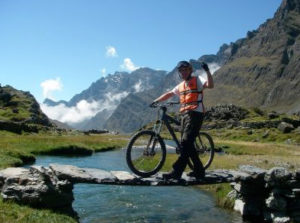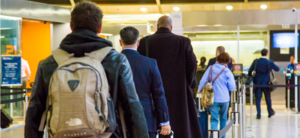Travel safety

Before you fly, check out these tips to make things go more smoothly
Leading-edge baby boomers — those born in the late 1940s — are now edging into their 70s, and with that inevitably come new challenges when we travel, no matter how healthy we are.
Much as we may hate to admit it (and I’m a prime offender in this regard), we may walk a bit slower, require assistance from time to time, and need to take care of ourselves a bit more.
Flying and airports can be especially vexing, and so I was struck by this piece by Bay Area freelance journalist Scott Morris from the excellent website caring.com that’s filled with tips on how to make the flying and airport experience a bit smoother.
Here’s Scott on a topic of interest to anyone who flies, but especially to older travelers:
By Scott Morris
Flying can be difficult… Continue reading

Before you fly, make sure your medical condition won’t hold you back
Note: This is the fourth in a series of guest posts on traveling with a medical condition by British writer Laura Miller. In this post, Laura provides advice on flying with a medical condition and obtaining the right vaccinations and visas for your trip.
By Laura Miller
Flying with a medical condition
While traveling with many medical conditions is generally safe, airlines do have the right to deny passengers who could suffer complications in the air.
For those travelling by plane, the most common in-flight problems are:
• Neurologic events
• Cardiac events
• Respiratory events
• Gastrointestinal events
• Vasovagal syncope (fainting)
If you’re worried about the risk of being denied passage, it’s worth speaking to your doctor to ask for medical clearance. Consider if any of the following apply:
• You could compromise the safety of… Continue reading

Florence, Italy, is a generally safe destination choice for those traveling with certain medical conditions. Photo by Dennis Cox/WorldViews
Note: This is the third in our series of Traveling with a Medical Condition, written by British journalist Laura Miller. Today Laura offers specific tips for traveling with cancer, a heart condition, or dementia.
By Laura Miller
Traveling with cancer
There’s no reason why a cancer diagnosis should limit your traveling. You’ll still want to see the world for the same reasons as everyone else and cancer shouldn’t be the barrier.
It’s not unusual for people with cancer to book up a holiday at the end of their treatment. On the other hand, others will have no qualms about leaving the country after being told the bad news.
However, it’s important to speak to your doctor and get their opinion before arranging a trip. You’ll then know the ins… Continue reading

Sit back, relax — but don’t get too comfy.
Unless you’ve been camping in the desert or just can’t face listening to the news lately, you’ve no doubt heard the story about the greatest PR disaster to befall an airline since, well, maybe ever.
And it couldn’t have happened to a nicer airline: United, or — as I fondly call them — Untied Airlines.
To briefly recap: On a recent flight scheduled from Chicago O’Hare to Louisville, Kentucky, United Airlines’ employees called in airport police to forcibly eject a 69-year-old baby boomer named David Dao, a physician who lives in Kentucky.
His crime? He refused to give up his seat and deplane when United decided that he and three other passengers picked “at random” had to leave to make room for an airline crew that needed to get to Louisville.
The punishment? The police officers literally dragged… Continue reading

When riding a camel, I just want to get there. Photo by Dennis Cox/WorldViews
Based on years of informal polling of friends and family, most everyone has pet peeves about words, phrases or expressions that leave them feeling like they’ve just heard chalk squeaking across a blackboard.
(I don’t know if teachers still employ chalk and blackboards, but baby boomers will remember.)
Words that irk. Phrases that irritate.
Many have to do with the workplace. For example, my daughter once had a friend who was a chef and couldn’t stand the word “meat.”
One of my brothers-in-law who works in business hates jargon-y business words like “parameters.”
My wife, a longtime magazine editor, is driven up a wall by nouns turned into verbs, such as “impact.”
A friend who is an avid cook despised the word “dollop,” to the point where he almost refused to serve sour cream… Continue reading

You can Bicycle the “World’s Deadliest Road” in Bolivia on this fun trip. Photo from Travel Supermarket
The infographic below from the UK-based TravelSupermarket.com came across my desk recently and I thought I would pass it along as a public service. It’s essentially a compendium of Extreme Adventures around the world that I can cross off my bucket list even before trying them.
Oh, I might try riding the Alpine rollercoaster in Austria or give the world’s fastest zip line in Wales a shot at pumping my adrenaline to warp speed.
But bungee jumping into a volcano in Chile, cliff camping in Colorado (yes, that means sleeping on the edge of the cliff), or riding a bike along Bolivia’s notorious Death Road?
Thanks, but I’ll leave those to another lifetime, which I would probably be starting soon if I succumbed to the temptation to try any of them, which… Continue reading
As airport security lines snaked around airports like giant boa constrictors threatening to strangle passengers trying to reach their gates this spring — with waits of an hour or more in some locations, and thousands of flights missed — my wife, Catharine, and I were generally able to waltz through security in under five minutes.
In most cases, we didn’t have to take off our shoes, belts, or light jackets, and sometimes I didn’t have to remove my laptop from my briefcase. We also didn’t have to go through those infernal body scanners that require you to remove even non-metal objects from your pockets; instead, we walked through simple metal detectors.
No, we’re not airline employees, or VIPs, or anything other than ordinary travelers. We weren’t flying first class or boasting elite status with the airlines. None of our relatives… Continue reading
In our last post, we posed ten questions that might affect your health and well-being as a traveler. Here are the answers:
1. The direction in which you fly may influence the severity of your jet lag. Other conditions being equal, which direction is most likely to produce bad jet lag?
Answer: B, West to east. When flying west to east, especially across America, you’re more likely to encounter darkness when you arrive, which helps disrupt the body’s “inner clock” (jet lag is caused by disorientation by crossing time zones, which exposure to light seems to ameliorate). Assuming no time zones are crossed, there’s technically no jet lag at all flying north-south or south-north, though you can still feel the ill effects of a long flight.
2. One good way to counter the effects of jet lag is to:
Answer: D… Continue reading
Jet lag, contaminated water, insect bites, infection, and injury away from home…the potential perils are enough to make some would-be travelers toss away those glossy brochures.
But knowledge, planning, and preventatives can help stave off many of travel’s unhealthy side effects — whether it’s flying fatigue, a nasty case of Togo two-step, or an emergency medical bill after you flip your whitewater raft in Nepal.
To test your knowledge of travel health issues, take our quiz.
1. The direction in which you fly may influence the severity of your jet lag. Other conditions being equal, which direction is most likely to produce bad jet lag?
a. East to west.
b. West to east.
c. North to south
d. South to north
2. One good way to counter the effects of jet lag is to:
a. Keep your watch set on “home… Continue reading
How careful are you about protecting your vital information while traveling? If you’re like me, you’ve left yourself vulnerable from time to time — maybe tapping into someone’s else’s unsecured network to use their Wi-Fi, or using an ATM on a busy street that presents an easy target for thieves to steal your PIN number, if they’re lurking nearby.
So far I’ve managed to avoid those types of disasters, but I came across this list of tips for protecting your personal information on the road that convinces me I’ve been more lucky than smart about it. The list comes courtesy of Experian’s ProtectMyID (www.protectmyid.com), and I’m going to start paying closer attention to its warnings:
- Get Your Own Hotspot: Consider a portable router to create your own Wi-Fi hotspot for your electronic devices and that of any… Continue reading












